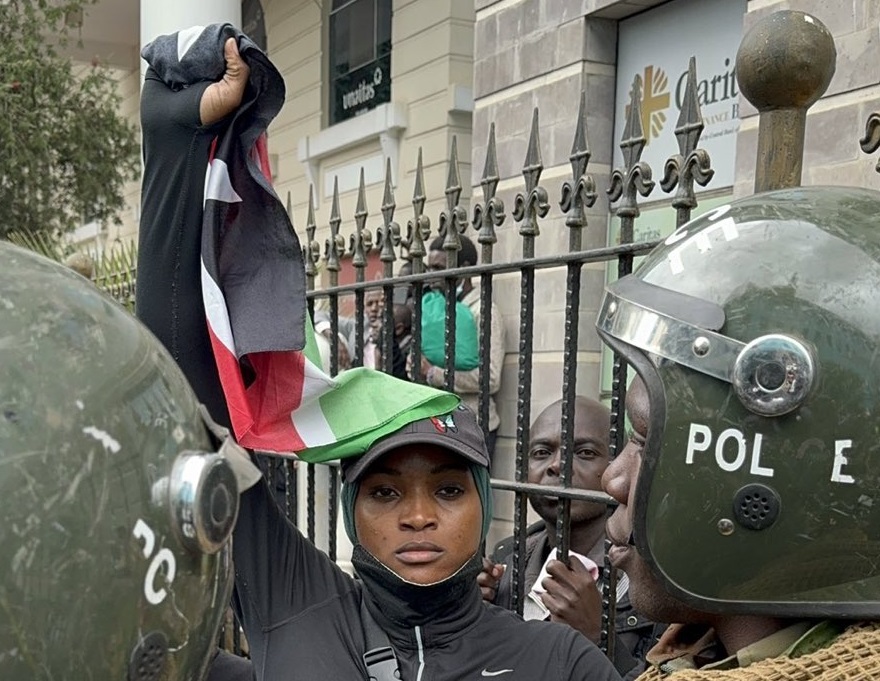Activist Shakira Wafula speaks on reason Gen Zs don’t want a leader yet

Activist Shakira Wafula has offered a compelling perspective on why Kenya’s Generation Z remains firmly opposed to having a singular, centralised leader at the helm of its civic engagements, arguing that the historical co-option of prominent figures into systems of power has often derailed otherwise well-intentioned movements and undermined their original cause.
Speaking during an interview with a local TV station on Monday, April 14, 2025, Wafula said that the insistence on a leaderless movement is not a sign of disorganisation or apathy, but rather a deliberate strategy aimed at protecting the integrity of their campaign for good governance.
“We really like to emphasise being leaderless,” she explained, “because historically, when a few individuals are identified and elevated as leaders, they end up being bought off, absorbed into existing political frameworks, or otherwise compromised—and that is how many past campaigns have lost momentum and ultimately collapsed.”
Wafula believes that the strength of the Gen Z movement lies precisely in its dispersion—its ability to exist simultaneously across numerous, diverse spaces—so that even if one voice is silenced or swayed, the broader cause remains intact and continues to thrive through the independent efforts of others equally committed to the call for accountability, transparency, and progressive governance.
However, she acknowledges that this decentralised model is not without its shortcomings.
The absence of a unified structure, she notes, often means that efforts are fragmented and uncoordinated, with various initiatives unfolding independently in different parts of the country without necessarily converging towards a shared strategy or end goal.

“It’s like small, small efforts happening in different spaces,” she said. “What I’m personally working on now is to begin consolidating these efforts—identifying what is taking place in different areas and exploring how we might pull those energies together, align them, and work towards a common objective.”
She was quick to clarify, though, that being leaderless does not mean the absence of leadership altogether.
In her view, there are many young people already demonstrating leadership in various ways, but the movement intentionally avoids placing too much power or visibility in the hands of any single individual, precisely to guard against the possibility of manipulation or disillusionment should that individual falter.
“In the sense of being leaderless, I believe if I care about the well-being of our nation, then I, as an individual, have a responsibility to act in a way that contributes to positive change,” she said.
“But inevitably, there will always be those who rise to more prominent roles, who attract greater influence, and who—by virtue of their visibility—become symbols of the movement, whether they wish to or not. These individuals are then held to a higher moral standard and often end up absorbing the backlash or blame that comes when anything goes wrong.”
Wafula also pointed out that Kenya’s youth movement is far from homogeneous.
She described it as a constellation of diverse voices, ideas, and approaches—each informed by different lived realities and personal convictions. And while many onlookers assume that there is consensus or cohesion among young people, the truth, she says, is far more complex.
“What was recently assumed is that we usually meet and agree on issues—but we’ve never actually had a big meeting where young people sat down and collectively deliberated on matters,” she noted.
She also spoke candidly about her own experience being branded a sell-out after meeting the Queen of the Netherlands during a recent royal visit to Kenya. The encounter, while diplomatic in nature, drew ire from a section of online commentators who began to speculate that she had been compromised or politically influenced.
However, she insisted that she had not been bought by any politician and maintained that all the swirling claims suggesting Ruto had paid her to receive the Queen were entirely fabricated.
“Some people supported me and understood what I was doing, but others didn’t. And then certain individuals picked up that incident and spun it into whatever stories they wanted—claims that I’d been paid by Ruto to attend or that I’d been invited by Ruto, none of which were true.”
Anti Finance Bill protests
Shakira, who is also a policy advocate, became one of the most recognisable faces of Kenya’s June 2024 Gen Z-led anti-finance bill protests after a video of her passionately confronting police officers in Nairobi went viral online.

The video, which was widely circulated on X (formerly Twitter), showed Wafula standing firm against a wall of riot police, urging them to respect citizens’ rights and questioning the excessive use of force on peaceful demonstrators.
Her boldness, calm articulation, and unwavering stance drew admiration from thousands, with many dubbing her “the voice of reason” during the nationwide unrest.












